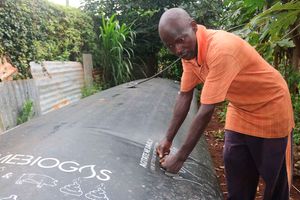Unpacking Kenya’s carbon market regulations

Carbon trade is the buying and selling of credits that permit a company or other entity to emit a certain amount of carbon dioxide or other greenhouse gases
What you need to know:
- Carbon trading is expected to be pivotal in fulfilling the Paris Agreement and implementing Nationally Determined Contributions (NDCs).
- Article 6 of the Paris Agreement facilitates international recognition of cooperative carbon trading approaches and identifies new concepts that may facilitate this cooperation.
Long-term temperature shifts and changing weather patterns have been hallmarks of the world's unprecedented climate change, which is primarily due to human activity.
These climatic changes have severely affected various socio-economic activities such as agriculture, natural biodiversity, energy and tourism. Extreme weather conditions like increased drought, loss of species, severe storms and hotter temperatures necessitate immediate action.
In response, governments worldwide have adopted various mechanisms to mitigate climate impacts and promote sustainable development. One prominent mechanism is carbon trading. Carbon trading originated from the Kyoto Protocol, which established three innovative mechanisms: Emissions Trading/Carbon Market), Clean Development Mechanisms and Joint Implementation. These mechanisms are critical for stimulating investment in clean technologies, particularly in developing nations.
Carbon trading is expected to be pivotal in fulfilling the Paris Agreement and implementing Nationally Determined Contributions (NDCs). Article 6 of the Paris Agreement facilitates international recognition of cooperative carbon trading approaches and identifies new concepts that may facilitate this cooperation.
Kenya has been actively involved in global efforts to address climate change, signing international agreements, adopting new environmental policies and implementing regulations. The country has attracted significant investments in carbon projects, with companies like Gucci and Netflix already offsetting emissions through Kenyan projects.
The Kenyan government sees carbon credits as a potential export, with President William Ruto highlighting this during COP 27 and at the first Africa Climate Summit. According to the Kenya Private Sector Alliance, Kenya has issued more carbon credits than any other African country, accounting for approximately 20 per cent of total African credits.
Kenya’s Climate Change (Carbon Markets) Regulations, 2024, gazetted on May 17, 2024, set the stage for regulatory oversight of carbon project development and management in the country.
The regulations follow the Climate Change (Amendment) Act 2023 (the Act), which amended the Climate Change Act 2016 to introduce provisions regulating participation in carbon markets. The regulations introduce key provisions covering several areas such as:
Governance and institutional framework
Any carbon project will be reviewed according to the regulations by the Designated National Authority (DNA), the Climate Change Directorate, the National Carbon Registry and an ad-hoc committee.
The DNA will oversee all carbon market activities, determine project concept notes, issue letters of no objection for approved projects and appoint project-specific ad hoc committees.
Regulation 9 sets up a multi-sectoral technical committee to support the DNA in advising on carbon project assessment. The Climate Change Directorate will coordinate stakeholders for carbon market management, facilitate research and advise the government on new measures.
The National Carbon Registry
The DNA, which acts as the national registrar, will oversee the National Carbon Registry, established under Section 23G of the Act. The DNA will also maintain and update carbon project registries in the energy, transport, agriculture, forestry, industrial processes and waste sectors. The Cabinet secretary will appoint sector registrars to lead the six sector registries.
Participation in carbon markets
The regulations state that to receive project approval; a proponent must be a legal entity with the financial capacity and knowledge to undertake a carbon project. They will also need to disclose project costs, expected emission reductions and estimated revenue and regularly verify emission reductions to the DNA.
Procedures for developing carbon offset projects
The regulations provide a detailed process for obtaining authorisation to start a carbon offset project. The project proponent will submit an application to the DNA for approval and after a meticulous and comprehensive assessment, the DNA may approve or reject the project idea.
Upon approval, the proponent will prepare a concept note for assessment by a technical committee. If successful, the proponent will prepare a project design document for approval by the relevant Cabinet secretary. The proponents must start implementing the carbon project within 12 months of approval.
Land-based and non-land based projects
The regulations define a land-based carbon project as "any project that involves activities related to land use, land management and ecosystem conservation or restoration aimed at reducing greenhouse gas emissions or carbon sequestration."
Non-land-based projects reduce greenhouse gas emissions or remove carbon dioxide from the atmosphere without using technology for execution. They can be household or institutional green technologies like hand-held solar lighting, energy-efficient cookstoves, water purification and electric-powered or green transport.
Annual social contributions
The regulations specify that land-based public or community land projects must contribute at least 40 per cent of their previous year's earnings to the community. In comparison, non-land-based projects must contribute at least 25 per cent. This addresses concerns about past projects lacking evident community benefit-sharing mechanisms.
Environmental protection
The National Environment Management Agency will conduct an environmental impact assessment on all projects and require proponents to undertake an environmental audit. This will ensure responsible project implementation that minimises environmental harm.
Transition
The regulations provide that all project proponents engaged in carbon project activities before the regulations came into effect must comply with them within two years of commencement. To ensure a smooth transition for existing projects and uphold the new standards, ongoing projects will undertake an environmental audit within six months of the regulations' commencement.
Carbon projects are beneficial when proper checks and balances are in place, especially in areas with limited access to finance. However, there are challenges. For example, the gazetted regulations do not define the legal status of carbon credits or the general mechanism for synchronising carbon trading transactions on the international voluntary carbon market with the National Carbon Registry.
To fully unlock Kenya's carbon market's potential, businesses and the government must actively address the emerging challenges. Investors and companies must ensure that their investments contribute to sustainable development, encompassing the environment, climate and people's well-being. Investing in the climate at the expense of people is not a victory.





